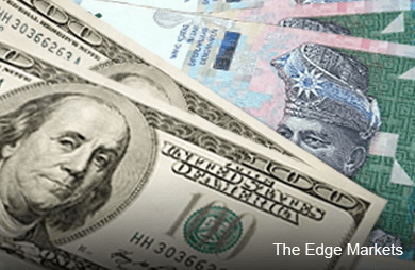
This article first appeared in The Edge Financial Daily, on 30 November, 2015.
KUALA LUMPUR: As 3Q earnings season winds down, the weak ringgit continues to cast a shadow over companies, some of which are still reeling from the impact of the goods and services tax (GST) in April.

Companies with high exposure to foreign borrowings have been hit hardest as the depreciating local currency against the US dollar dragged down their earnings for a second consecutive quarter this year, and analysts see no signs of this trend letting up.
Year-to-date, the ringgit has lost 21.6% against the greenback to 4.2535 last Friday from 3.4973 a year ago, on concerns over slumping crude oil prices, rising US interest rates and to an extent, the political uncertainty.
RHB Research Institute Sdn Bhd chief economist for Asean Peck Boon Soon opined that the ringgit will continue to trade at its current levels till the end of the year.
“I think the ringgit is now trading at levels that are reflective of the various negative factors causing its slump and I don’t see it weakening further. I think the ringgit should remain at its current levels [till year end],” he told The Edge Financial Daily.
However, this will still not bode well for companies with huge foreign borrowings that had their earnings intact when the ringgit was trading at levels of 3.26 against the US dollar as of September last year, compared with 4.3863 in September.
The latest earnings season saw Bursa Malaysia-listed companies such as IOI Corp Bhd (fundamental:0.35; valuation: 0.3), Telekom Malaysia Bhd (TM) (fundamental:0.8; valuation: 1.1), AirAsia Bhd (fundamental:0.2; valuation: 1.2), AirAsia X Bhd (AAX) (fundamental: 0.2; valuation: 0.9) and IHH Healthcare Bhd (fundamental:1.65; valuation: 0.5) attributing their drop in profitability for the September quarter to the impact of foreign exchange (forex) losses suffered due to the weak ringgit.
IOI Corp plunged into the red in the quarter ended Sept 30, 2015, primarily due to forex loss of RM853.9 million on translation of its US dollar-denominated borrowings. Forex losses on borrowings also pulled down TM’s 3Q net profit by 12% year-on-year (y-o-y) to RM166.87 million from RM188.85 million.
AirAsia slipped into the red in the 3Q, with a net loss of RM405.72 million in 3QFY15 due to a RM435.98 million forex loss on borrowings for the quarter, while its long haul-low cost affiliate AAX saw its net loss widening by 36.7% to RM288.19 million, also due to forex losses.
The weak ringgit also pulled down IHH’s 3Q net profit by 19.3% y-o-y to RM118.49 million from RM146.91 million a year ago, as its forex losses amounted to RM217.1 million.
Public Investment Bank Bhd head of research Ching Weng Jin said the real impact from forex losses to these companies will depend on the nature of the debt transaction.
“It depends on what kind of debt they have — whether it is an operational debt or an accounting entry that will be reversed later should the ringgit strengthen,” he said.
Etiqa Insurance and Takaful head of research Chris Eng Poh Yoon concurred.
“If it’s unrealised forex losses, the companies are dependent upon the forex level at the end of every quarter. And with the ringgit now at levels of 4.2 which is not too different from where it was on Sept 30, these unrealised losses will be much smaller and if the ringgit strengthens further they may even be reversed.
“However, for realised operational losses that are linked to ringgit levels on a year-on-year basis, those will persist for some time,” said Eng.
Share prices of companies affected adversely by the weak ringgit have also taken a beating after reporting weaker earnings.
Year-to-date, TM’s share price has fallen 4.1% to close at RM6.60 last Friday, AirAsia has tumbled 51.1% to RM1.33, while AAX has dropped 64.4% to 18.5 sen.
Nevertheless, Jupiter Securities Sdn Bhd chief market strategist Benny Lee is of the view that now is not the right time for investors to be accumulating stocks which have been impacted by forex losses.
“The ringgit may have showed some strength of late against the greenback, but there is still the imminent decision by the US Federal Reserve whether or not to raise its interest rates in December, which may cause the ringgit to depreciate further. So, I do not think now is a good time for investors to be accumulating these stocks,” he said.
JF Apex Securities Bhd senior analyst Lee Cherng Wee said with the ringgit volatility, a safer investing bet would be stocks that benefit from the weak ringgit.
“I think export-oriented counters [such as furniture makers, glove manfacturers, semiconductor manufacturers and timber companies] that have displayed stellar earnings thanks to the weak ringgit, would be a safer investing option,” he said.
Still, CIMB Investment Bank Bhd head of equity research Terence Wong said it’s not all doom and gloom for sectors that are impacted by the weak ringgit.
“Aside from the automotive sector, sectors such as the airline and consumer sectors have natural hedges that will offset the impact of the weak ringgit, and I think the latest round of corporate earnings were not as bad as expected.
“Therefore for investors taking a long term approach, it will be a good opportunity for them to bottom fish,” Wong added.
The Edge Research’s fundamental score reflects a company’s profitability and balance sheet strength, calculated based on historical numbers. The valuation score determines if a stock is attractively valued or not, also based on historical numbers. A score of 3 suggests strong fundamentals and attractive valuations. Go to www.theedgemarkets.com for more details on a company’s financial dashboard.